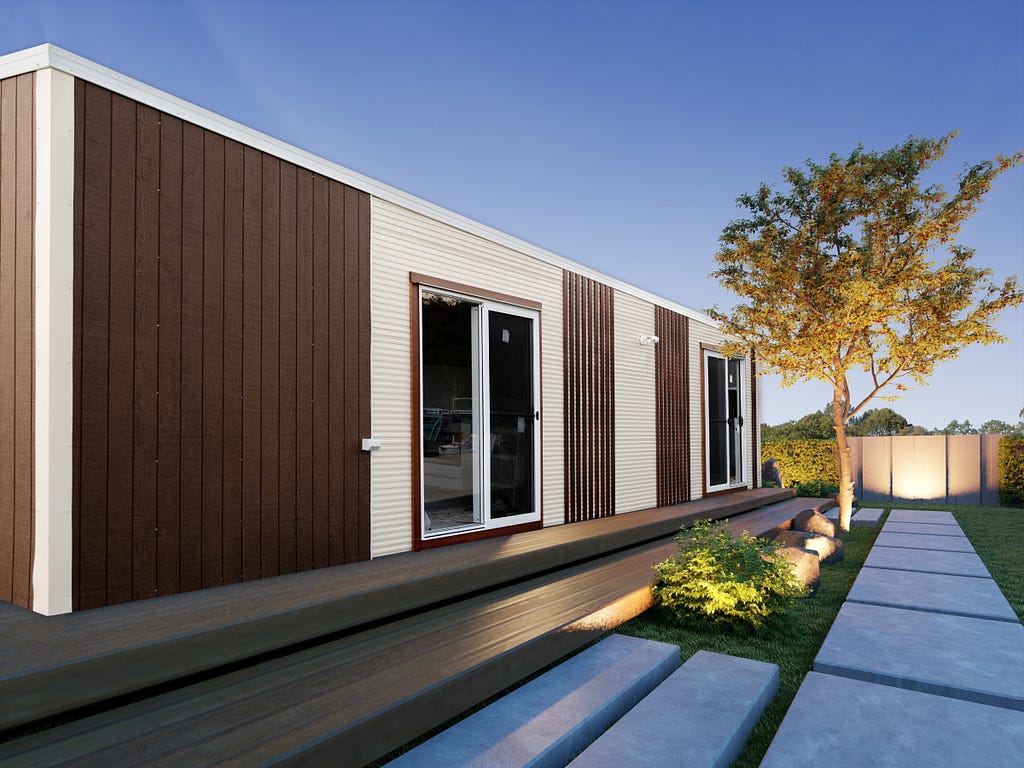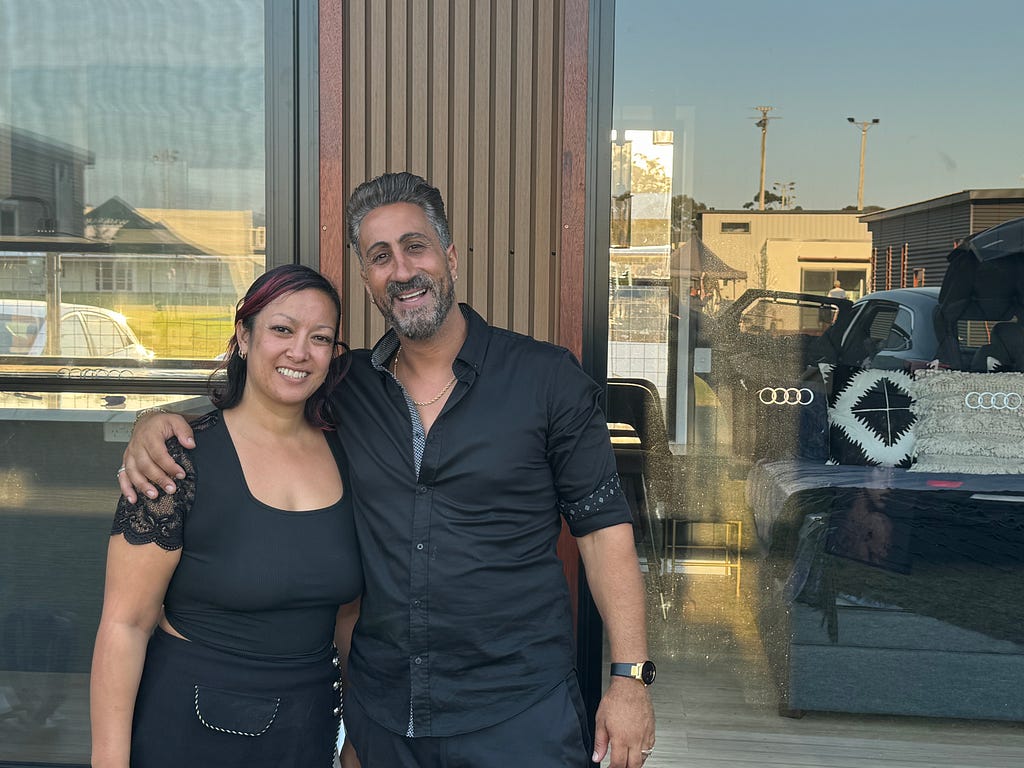An Interview With Maria Angelova
Build new, don’t renovate: Starting with second-hand office buildings was harder and less effective than manufacturing from scratch. Transitioning to new builds improved our quality dramatically.
As a part of my series about “individuals and organizations making an important social impact”, I had the pleasure of interviewing David Antonacci.
David Antonacci is the lead director and CEO of Teeny Tiny Homes, a family-owned and operated business dedicated to making affordable housing a reality for Australians. Since its inception in September 2016, Teeny Tiny Homes has designed and delivered 360 tiny homes and transportable buildings, helping first-time buyers, retirees, and minimalists across the country achieve their dreams. With a history of entrepreneurship, commitment to innovation, and a passion for social impact, David’s latest venture is transforming the housing market, empowering financial independence, and fostering economic growth one tiny home at a time.
Teeny Tiny Homes is a pioneering venture providing affordable housing by bridging the gap between affordability and quality. Over the past 8 years they have endeavoured to make homeownership a tangible reality for individuals from diverse socioeconomic backgrounds. Teeny Tiny Homes specialises in crafting compact yet functional living spaces without a burdensome mortgage. The concept originated from personal experience and passion, understanding modern market demands, and a desire to support those seeking financial relief by securing affordable housing.
“We conceived the idea of constructing granny flats on unused corners of acreage so that we could enjoy a tiny home without the mortgage. However, it has grown to be so much more.”
The compact dwellings, designed with economic pragmatism in mind, also serve as in-demand rental properties, offering a steady income stream for those who have some spare land to place it on. They are portable, transportable, and modular granny flats that allow everyone to own a tiny home or secure a secondary rental income.
The business accelerated once they built and sold the initial granny flat design, leading to an unexpected demand frenzy, turning Teeny Tiny Homes into a full-fledged enterprise and alternative housing solutions.
Thank you so much for joining us in this interview series! Can you tell us a story about what brought you to this specific career path?
I’ve owned and operated various businesses since 2003 — ranging from pizza shops to chocolate fountain hire, men’s dress shoes, and ice sculpting. Along the way, I realised the pressing need for affordable, alternative living in Australia. Rather than being part of the problem, I wanted to contribute to a solution. Inspired by the US tiny house movement, I began renovating transportable granny flats and offering them at affordable prices. Eventually, I shifted to custom-made tiny homes tailored to individual needs. My experience as an ice sculptor, which required precision and attention to detail, influenced our approach to designing and building homes that are both functional and beautiful.
Can you share the most interesting story that happened to you since you began leading your company or organization?
Two of Australia’s biggest free-to-air TV channels reached out to feature us in lifestyle segments. We appeared on Channel 9 Life’s Dream Houses Revealed in a “Small Spaces” episode and a Channel 7 news story on affordable housing. These moments allowed us to share our mission with a national audience and inspire people across Australia about the possibilities of tiny home living.
It has been said that our mistakes can be our greatest teachers. Can you share a story about the funniest mistake you made when you were first starting? Can you tell us what lesson you learned from that? Early on, I bought a large quantity of second-hand materials to save costs, thinking it was a smart way to keep budgets low. However, we soon discovered these materials weren’t fit for purpose, and we ended up spending even more replacing them with quality materials. The lesson was clear: never compromise on quality, as it defines the long-term value of your product and customer trust.
Can you describe how you or your organization is making a significant social impact?
Homeownership is increasingly out of reach for many Australians, especially younger generations who feel they may never afford their own home. Teeny Tiny Homes addresses this challenge by providing affordable housing options. Tiny homes are less expensive to build and maintain than traditional homes, allowing buyers to avoid burdensome mortgages while cutting costs on utilities like heating and cooling.
Our homes are eco-friendly, compact, and customizable to match individual personalities and needs. Some of our customers even use their tiny homes as rental properties, creating extra income streams while addressing housing shortages.
What sets Teeny Tiny Homes apart is our transparency in pricing. Unlike many competitors, we display our prices openly on our website, ensuring customers feel informed and confident from the start. Additionally, we source materials locally and partner with regional tradespeople, supporting the local economy while reducing environmental impact. We’re also committed to giving back. A core company belief is to allocate 10% of our profits to philanthropic causes, both in Australia and abroad. For example, we financially support an orphanage in Seminyak, Indonesia, covering their rent for 10 years.
Can you tell us a story about a particular individual who was impacted or helped by your cause?
One customer was a retired woman who had never owned a home due to being in the lower income bracket her entire life. She had $100,000 in savings and used it to purchase one of our tiny homes, which she installed on her family member’s property. For the first time in 60 years, she owned her own home. Seeing her joy and pride reinforced why we do what we do.
Are there three things the community/society/politicians can do to help you address the root of the problem you are trying to solve?
- Relax local council regulations for secondary dwellings: Simplifying rules around small dwellings would remove barriers for people wanting to own and occupy tiny homes.
- Adjust National Building Code for tiny homes: Loosening some requirements for Liveable Housing expectations would provide more flexibility and opportunity for tiny home construction.
- Advocate for tiny homes as legitimate housing options: Politicians and industry leaders need to push for tiny homes to be included in banking and brokerage processes, increasing their accessibility for aspiring homeowners.
How do you define “Leadership”?
Can you explain what you mean or give an example? Leadership means leading by example. If you’re not willing to do the hard work, your team won’t perform to their full potential. A true leader leads from the front and sets the tone for success.

What are your “5 things I wish someone told me when I first started” and why? Please share a story or example for each.
- Build new, don’t renovate: Starting with second-hand office buildings was harder and less effective than manufacturing from scratch. Transitioning to new builds improved our quality dramatically.
- Invest in supplier relationships: Strong relationships lead to better pricing and faster turnaround times.
- Transparency is key: Openly sharing prices and processes builds customer trust and streamlines their journey.
- Create a family atmosphere: A supportive workplace fosters loyalty and reduces staff turnover.
- Be prepared for growth: Hiring a business coach helped me navigate the challenges of scaling up.
You are a person of enormous influence. If you could inspire a movement that would bring the most amount of good to the most amount of people, what would that be?
You never know what your idea can trigger. I would fund homes and schools in third-world countries for orphans and low-income families, helping entire communities grow.
Can you please give us your favorite “Life Lesson Quote”? Can you share how that was relevant to you in your life?
“Ask…and you will receive. Seek…and you will find. Knock…and it will open for you.” This has guided me to ask the right questions and create a roadmap for success.
Is there a person in the world, or in the US with whom you would like to have a private breakfast or lunch with, and why? He or she might just see this, especially if we tag them. 🙂
Tony Robbins. He is a fantastic role model that has influenced me a lot in my own life with my mindset and business. I would love the chance to sit down with him and ask questions to obtain even more knowledge to add to my personal and professional toolkit.
How can our readers further follow your work online?
Follow us on Facebook here, Instagram here, or visit our website: www.teenytinyhomes.com.au.
Thank you so much for your time and for everything that you and your team do. It’s greatly appreciated.
About The Interviewer: Maria Angelova, MBA is a disruptor, author, motivational speaker, body-mind expert, Pilates teacher and founder and CEO of Rebellious Intl. As a disruptor, Maria is on a mission to change the face of the wellness industry by shifting the self-care mindset for consumers and providers alike. As a mind-body coach, Maria’s superpower is alignment which helps clients create a strong body and a calm mind so they can live a life of freedom, happiness and fulfillment. Prior to founding Rebellious Intl, Maria was a Finance Director and a professional with 17+ years of progressive corporate experience in the Telecommunications, Finance, and Insurance industries. Born in Bulgaria, Maria moved to the United States in 1992. She graduated summa cum laude from both Georgia State University (MBA, Finance) and the University of Georgia (BBA, Finance). Maria’s favorite job is being a mom. Maria enjoys learning, coaching, creating authentic connections, working out, Latin dancing, traveling, and spending time with her tribe. To contact Maria, email her at angelova@rebellious-intl.com. To schedule a free consultation, click here.
Social Impact Heroes: Why & How David Antonacci Is Helping To Change Our World was originally published in Authority Magazine on Medium, where people are continuing the conversation by highlighting and responding to this story.
